19.3.2024
Language cafés offer learning in a relaxed setting
The language cafés hosted by the Language Centre at Åbo Akademi University offer a relaxed setting for international students who want to improve their skills in Swedish or Finnish together with other students and native speakers.
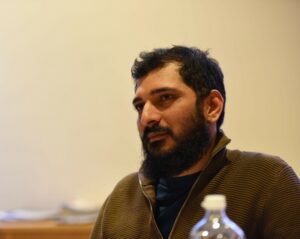
Do you remember how you learned you own mother tongue? Many of us struggle with learning new languages despite taking courses, using apps and trying to memorize the words and the rules.
– Don’t think like an adult about learning a language, how did you learn your own language, says Zill Ellah, one of the participants at the language café in Turku.
– Regular language courses are not enough to learn to speak the language, and I wanted to practice oral skills and apply what I have learned in the courses in practice, says Rezwanul Haque at the language café in Vaasa.
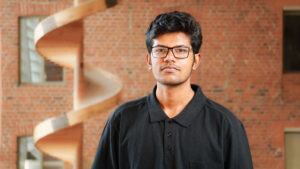
Courses are of course an important part of learning languages, but the opportunity to use it in everyday situations is also an essential part of the learning process, and that is one of the functions of the language café.
A learning opportunity for everyone
The language cafés started in the spring of 2023 and continued during the autumn. This spring there will be a total of ten language cafés in Turku and nine in Vaasa. The cafés are arranged by the Language Centre and financed by Talent Boost. Talent Boost is a national programme aimed at attracting and assisting international talent in Finland. The events themselves are organized and planned by fellow students who act as language tutors.
– Our task is to make the participants feel comfortable in using the language, and to motivate them through different activities, says Jannika Tallgård, who is one of the tutors in Vaasa.
The language cafés are aimed at international students who want to improve their skills in Swedish or Finnish by engaging in conversations on a range of different topics together with other students and native speakers in a relaxed environment with a low threshold to participate.
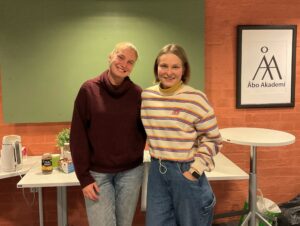
– Most of the sessions take place on campus. We have also been on walks in the city, and we’re planning to arrange a picnic for the last session, says Viveca Hansson, Tallgård’s co-tutor in Vaasa.
The cafés are suitable for students at different skill levels and the tutors can adapt to accommodate students at different parts of the learning process, and the students are at very different part of their language journeys. Some have just finished their beginner courses while others have passed tests in the National Certificates of Language Proficiency (YKI), necessary for applying for Finnish citizenship.
Everybody knows English, and it’s a double edged sword
On a daily basis, many international students may not have many opportunities to practices their skills in Swedish or Finnish.
– It is both a good and a bad thing that everybody here knows English, says Hamid Reza at the language café in Turku.
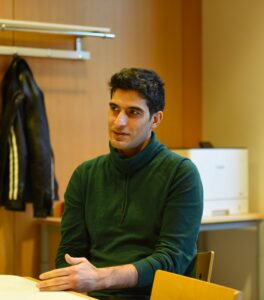
He explains that people are quick to change to English if you are struggling when talking Finnish or Swedish. This is one of the reasons why the language café is appreciated, it is an opportunity to improve your language skill together with both other students in the same situation as well as native speakers. Reza thinks the language cafés create a routine that also helps improvement, and he plans to continue to attend.
– The cafés also fills a social function, says Ellah.
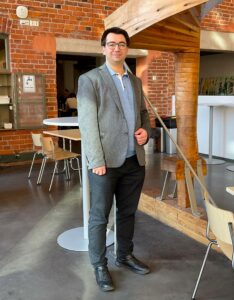
The students, as well as the tutors, appreciate the social function the cafés fills. Since the themes discussed during the sessions varies, the students often get an opportunity to learn more about both Finland and the city they’re studying in, while the tutors have the opportunity to learn from students who come from different parts of the world.
There is a good variety of discussion topics and activities, such as quizzes, games, question of the day followed by discussions and dialogues, says Karhan Özdenkçi in Vaasa.
Andrei Morariu has been attending the language café since last autumn and he has also taken courses in Swedish prior to it. While he loses out on the café session, he chooses to conduct the interview in Swedish to make up for it.
– Don’t worry about saying the wrong thing, we can learn from each other, and others are and have been in the same situation, says Morariu.
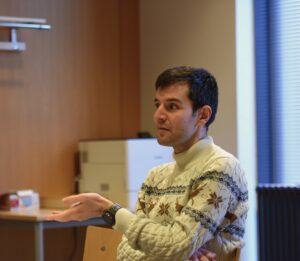
Many of the participants have previous experience of studying Swedish or Finnish. However, Ellah and Reza think that there is not much motivation for international students to learn either language unless they are planning to stay in Finland also after graduating.
From tutorship to friendship
The language cafés currently has five tutors, three in Turku and two in Vaasa. Krista Virtanen, Cecilia Emas and Signe Nynäs are language tutors in Turku, while Tallgård and Hansson are tutors in Vaasa. They all applied to become tutors because they believed it could an interesting experience. Their their expectations were met and it is not only the students who learn new things, the tutors do as well.
– It’s fun to meet new people and hear their experiences. We have a nice and calm atmosphere here, and we get to learn about other cultures as well, says Hansson.
Not only is it both rewarding and fun to arrange the cafés, the tutors in Turku did not really know each other prior to becoming tutors, but have since become good friends.
– It’s also a way to improve yourself, for example, earlier I used to be pretty shy, says Virtanen.
– It does help to be outgoing and extroverted since you can’t be in the background as a tutor, you have to be prepared to take initiative and engage the students if necessary, Emas continues.

– You can’t be afraid of sometimes making a bit of a fool of yourself, but I think it also lowers the threshold for students to participate, says Nynäs.
More information on the language cafés can be found here.
Student tips for learning language
- Reading and listening to the news (Yle has “easy to understand news” in both Swedish and Finnish suitable for beginners)
- Podcasts and music, for example, Spotify has podcasts for learning languages.
- Don’t worry about making mistakes, just speak and listen.
- Define your reason for learning the language, and don’t take prolonged pauses in your studies. A reason to learn creates motivation, which is the best driving force for learning.
- And of course, attend language cafés.